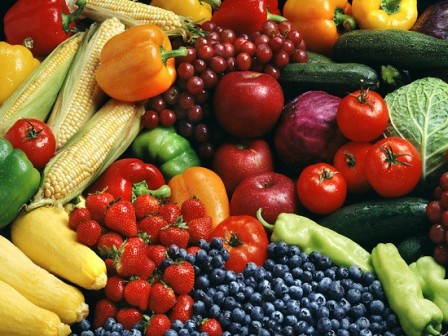Important Vitamins for Eczema
Best Food Sources
by Nancy Hearn, CNC
Note: As an Amazon Associate I earn from qualifying purchases.
The most important vitamins for eczema are found primarily in a wide array of leafy green vegetables and fruits.
Eczema is a skin condition which often (but not always) affects allergy-prone individuals.
Inflammation of the skin that comes with eczema usually produces itching, scaling, flaking, weeping, crusting and/or color changes. It often appears on the face, behind the knees and in the bends of the elbows.
Allergy triggers for eczema vary, but the most common have to do with weather changes, exposure to allergens and viral or bacterial infections.
It's beneficial to apply topical treatments and avoid allergens, as well as eating primarily a whole foods diet and maintaining a healthy ratio of essential fatty acids (EFA's).
The following vitamins can help to lessen the symptoms and prevent recurrence of eczema, according to Phyllis A. Balch, author of "Prescription for Nutritional Healing."
The best sources of these vitamins for eczema are from foods; however, nutritional supplementation may be helpful on occasion.
Vitamin A
Vitamin A enhances immunity and is needed for maintenance and repair of skin tissue. It acts as an antioxidant, helping to protect cells from oxidative and free radical damage. A deficiency of vitamin A is often associated with many skin disorders, including eczema.
Good food sources include fish liver oils and yellow and green fruits and vegetables, including asparagus, broccoli, carrots, apricots, dulce, kale, papayas, peaches, pumpkin and yellow squash.
Vitamin B Complex
These vitamins act as co-enzymes, which help other enzymes to activate nutrients, and are involved in energy production.
B-complex vitamins are often referred to as anti-stress vitamins. They help in the growth and maintenance of nerves, skin, eyes, hair, muscle tone in the gastrointestinal tract and proper brain function.
B vitamins should always be taken together because they work most effectively as a team.
The richest and healthiest food sources of B vitamins for eczema include brewer's yeast, eggs, legumes, rice bran, wheat germ, whole grains, broccoli, seafood, spinach and other leafy green vegetables.
Vitamin C
Required for at least 300 metabolic processes in the body, including tissue growth and repair, vitamin C is another powerful antioxidant that improves skin health and can minimize the effects of eczema. It can combine with toxic substances in the body (such as allergens) and help remove them.
Vitamin C is found in all types of berries, citrus fruits and green vegetables.
In addition, these same foods contain a plant-based flavonoid called quercetin which gives fruits and vegetables their rich color. Quercetin is a powerful antioxidant, antihistamine and anti-inflammatory substance.
Vitamin D
Vitamin D is another antioxidant. It protects skin from the damaging effects of UV rays. It can also help with some of the symptoms of eczema, including itchiness, dryness and redness.
Exposing your face and arms to the sun for 15 minutes three times a week is the most effective way to get adequate amounts of vitamin D in the body.
Some food sources include fish liver oils, dairy products, eggs and fatty fish. The Omega-3 fatty acids in the fish will also be highly beneficial for helping to reduce inflammation.
Vitamin E
Used in many topical treatments for eczema because of its proven effectiveness, vitamin E can improve the skin's appearance and help reduce dryness and soreness.
As an antioxidant, vitamin E helps with eczema by preventing cellular damage from free radicals and the oxidation of fats.
Vitamin E is found in cold pressed vegetable oils, dark green leafy vegetables, nuts, seeds, legumes and whole grains.
References
Prescription for Nutritional Healing; Phyllis A. Balch, CNC; 2000.
Eczemaliving.com; Multivitamins and Supplements to Treat Eczema; 2016.
Further reading . . .
How to Hydrate Your Skin - 4 Key Factors
Return from Vitamins for Eczema to Water Nutrition
If you would like to reproduce or republish this article or any other article on this site, feel free to do so but please include a reference or link to the article at WaterBenefitsHealth.com.
Sign Up for Our Monthly
Newsletter
Visitor Comments
"This was the best and most straight forward info on the net yet. I asked a question and got an answer that made sense. Thank you so much!" - Linderlinder
FINALLY!!! I have been wondering about this for years with no 'solid' answer. This is exactly what I've been wanting to know! Thank you for this share..." by Andy
"Thank you for the information, Nancy. I appreciate it. Your article and findings are very helpful, referring to dehydration." - Carolyn
"Lemon water is one drink both my wife and I can't drink. It upsets our stomachs. We are in our sixties and in very good health—well, better health now that we drink about 2 liters plus of water each day. It has made so much difference to our digestive systems and recovery every day. Thank you for your website and effort." - Rod



